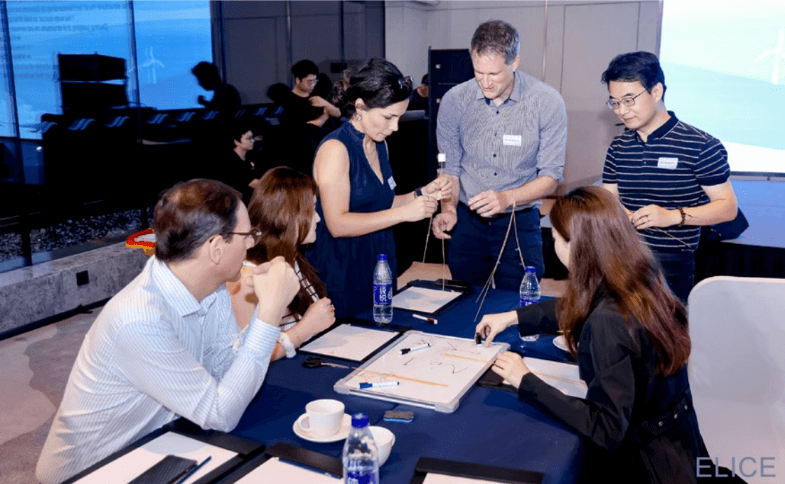ACAP workshop bringing Australian and Chinese clean energy innovators together delivers concrete results
- alisonpotter2
- Jun 26, 2025
- 4 min read
Updated: Jul 23, 2025
Empowering Emerging Leaders in Clean Energy Workshop 1
8–10 June 2025 | Shanghai, China
The first of a series of workshops and exchanges over two years bringing emerging entrepreneurs in clean energy from China and Australia together to build bilateral ties was an incredible success, igniting cross-border connections and new collaborations.

The Empowering Emerging Leaders in Clean Energy (ELICE) Workshop 1 brought together 39 emerging clean energy leaders (20 from Australia and 19 from China) for three intensive days in Shanghai and Jiaxing. The ELICE Program is run by the University of New South Wales (UNSW) and the Australian Centre for Advanced Photovoltaics (ACAP), and supported by the National Foundation for Australia-China Relations (NFACR). The workshop was jointly hosted with the Yangtze Institute for Solar Technology (YIST).
Day 1: Building Connections and Strategic Discussions
The workshop opened at the Hilton Shanghai Hongqiao with an icebreaker activity – the
'Marshmallow Challenge' – where mixed teams built structures using spaghetti, string, tape, and marshmallows.
Three structured discussions followed, addressing key industry challenges.

• The DNA of clean energy entrepreneurs
Participants identified resilience, scientific curiosity, and mission-driven leadership as essential traits. Many shared experiences transitioning between research, startups, and policy roles.

• Bridging the government-entrepreneur gap
Both Australian and Chinese participants highlighted alignment challenges between public policy and private innovation. Solutions discussed included improved regulatory communication, innovation-friendly procurement, and expanded demonstration projects.
• Unlocking China–Australia clean energy synergies
Participants recognised complementarity between Australia's research strengths and China's industrial capabilities. Despite barriers like IP protection and commercialisation
timelines, they identified opportunities in co-funded accelerators, cross-border pilots, and
bilateral talent programs.
Day 2: Leadership insights and innovation showcase
Keynotes and Panel Discussion

Professor Martin Green, Scientia Professor at UNSW and a global pioneer in photovoltaics,
delivered an inspirational opening keynote about the long history of Australia-China solar research and industry development. He emphasised how global decarbonisation depends on next-generation leadership alongside technological breakthroughs.
Professor Jihong Fan from the National Innovation Center par Excellence (NICE) outlined China's clean energy innovation framework, highlighting regional R&D clusters and coordinated investment platforms in the Yangtze River Delta, driving transformation in solar energy, hydrogen, and energy storage technologies through a globally connected innovation model.
Dr. Pierre Verlinden (YIST Chief Scientist) shared insights from decades of East-West collaboration in solar technology, emphasising academia-industry partnerships and lab-to-factory acceleration.

John Grimes (Smart Energy Council CEO) positioned clean energy within economic resilience and geopolitical transformation, urging Australian entrepreneurs to think globally and foster long-term partnerships.
A roundtable moderated by Professor Ned Ekins-Daukes featured industry leaders including Jingyi Zhang (NSW Government Trade & Investment), Dr. Cao Yu (CMBI Capital), Dr. Wei Zhao (Xi'an Yuri Solar), and Shitao Wang (Huzhou Leapting Technology). The discussion focused on commercialisation strategies, capital attraction, and building investor-innovator trust.

ELICE Startup pitch event
All participants delivered two-minute lightning pitches covering diverse innovations from solar module recycling to AI-powered materials discovery. Four finalists advanced to ten-minute presentations:

Dr. Rong Deng: Silicon solar cell recycling
Ms. Nomathemba Ndlovu: Solar panel reuse for Africa through Australia-China collaboration
Dr. Ian Thomas: Agrivoltaics research for combined renewable electricity and food production
Dr. Tong Xie: AI-powered materials discovery for clean energy applications.
ELICE Night and Innovation Award

The formal dinner was hosted by Program Lead Dr. Jessica Yajie Jiang and featured keynote remarks from Australian Consul-General John Williams, CAIEP Deputy Director Tao Qin, Professor Martin Green, Professor Hui Shen (Director of YIST), and Dr. Pierre Verlinden.
Dr. Tong Xie received the ELICE Innovation Champion Award for GreenDynamics, a platform using machine learning to accelerate clean energy materials discovery for solar fuels, hydrogen, and batteries.
Day 3: Industrial immersion in Jiaxing
Xiuzhou Photovoltaic Technology Hall

Participants explored China's solar energy policies, technological advances, and public-private cooperation models. Exhibits showcased PV module efficiency evolution and large-scale deployment case studies, with many noting parallels to Australian policy approaches.
LONGi Lighthouse Factory

The factory visit demonstrated advanced automated solar module manufacturing using AI,
robotics, and data analytics. Engineers engaged in technical discussions about adapting
manufacturing excellence to emerging markets and hybrid production models.
A highly impactful progam
The three-day workshop successfully demonstrated the strategic value of bilateral clean
energy talent exchange. Participants formed concrete partnerships and identified
collaboration opportunities spanning research, investment, and technology deployment.
Program Lead Dr. Jessica Yajie Jiang commented: "This workshop represents exactly what we envisioned when we launched the ELICE program, bringing together Australia's most
promising clean energy entrepreneurs with Chinese entrepreneurs, investors and industry
leaders to forge meaningful partnerships.
"It's incredibly encouraging to see new collaborations taking shape and genuine opportunities emerging from these cross-border connections.
The next ELICE workshop will be held in Brisbane.
"These relationships will be the foundation for accelerating clean energy innovation in both countries and strengthening the bilateral ties that are essential for our shared sustainable future."



Comments